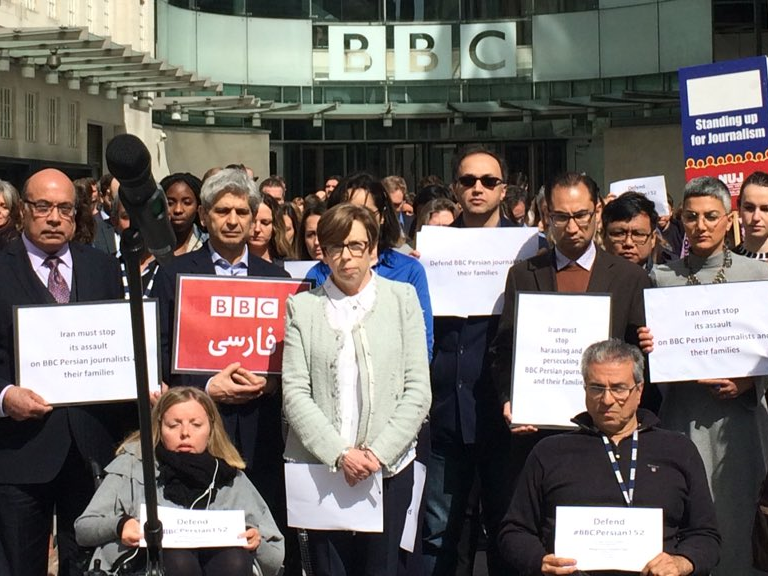
BBC News staff gathered outside Broadcasting House in London today, on World Press Freedom Day, to pay their respects to a BBC reporter and nine other journalists killed in the field this week.
BBC Afghan reporter Ahmad Shah was shot dead by unknown gunmen on Monday in the country’s Khost region, aged 29. The same day, a suicide bomber disguised as a press cameraman killed nine journalists in Kabul.
In a statement, BBC News director Francesca Unsworth (pictured, centre) said: “We are still trying to come to terms with the loss of a journalist who, like the others who died on Monday, was simply doing his job.
“The attacks claimed the lives of ten reporters in total, including those from AFP, Radio Free Europe, 1TV and Tolo News. We send our condolences to them all.”
World Press Freedom Day was launched by the United Nations to celebrate press freedom, defend the media from attacks on their independence and to pay tribute to journalists who have lost their lives in the profession.
Today, on the 25th anniversary of the event’s launch, publications across the UK also took the unusual step of encouraging readers to buy other titles.
As part of a partnership across publications, adverts in national newspapers called on readers to consume news from a wider variety of sources.
The campaign, led by the United Nations Educational, Scientific and Cultural Organisation, encourages readers to: “Read more. Listen more. Understand more,” and was published in papers such as the Financial Times, New York Times, and Wall Street Journal.
Some 37 news organisations have partnered with UNESCO including, BBC News, the Guardian and the Economist on the campaign.
UNESCO’s English editor, Roni Amelan, said: “Professional reporting depends on public awareness of the difference between sound balanced reporting and the dissemination of unverified stories of questionable accuracy.
“Hence the drive to promote public awareness of the need for multiple news sources to grasp and gauge the accuracy and significance of news.”
The New York Times chief operating officer, Meredith Levien, explained why the paper was supporting the scheme in a blog post.
She said: “These news organizations, and the dozens of others joining our campaign, all share a common commitment to original journalism that takes time, resources and expertise — a type of journalism that is increasingly endangered.
“Together, we are launching a campaign that seeks to remind people that a better informed world means a better world.”
Reporters Without Borders have also launched their own campaign, #FightFakeNews, as they claim combating disinformation is now one of the biggest challenges for journalism.
A minute long TV spot compares the consequences of fake news to that of fake vaccinations and electrical goods.
RSF secretary-general Christophe Deloire said: “As surveys have shown, fake news circulates more easily that trustworthy news because of a cognitive bias in human beings.
“We cannot remain passive in the face of this threat to the honesty of the public debate and, by extension, to democracy.”
Picture credit, Tess Colley/BBC
Email pged@pressgazette.co.uk to point out mistakes, provide story tips or send in a letter for publication on our "Letters Page" blog
